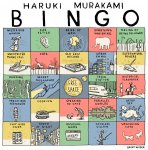Although his name has been mentioned in passing, we haven’t really discussed Haruki Murakami. He is a prolific author whose books have a large audience the world over. Every time I read one of them, I feel as if I need to concentrate very closely so as not to miss anything. Yes, I know this should be true for each and every book I open, but with Murakami details count and I have an almost febrile anxiety I’m going to miss something important. Of all the Murakami I have read, The Wind-Up Bird Chronicle seems to me his masterpiece: a novel with the emotional intensity and breadth of a Mahler symphony, a novel shot-through with all sorts of references to music that seems itself to have weirdly leitmotivic structure. So many strange details resurface, but the patterns only gradually emerge. It includes birds, both live and in sculpture, a missing cat, flashbacks to atrocities committed in Japanese-occupied Manchuria during WWII, something like a retelling of the story of Orpheus and Eurydice, fashion, computers in mid-1980s Japan, and so much else. Even if I were able to summarize the plot with any coherence, I would avoid doing so for fear of giving any of the detective story away. The fact that people, including many who don’t normally read much literary fiction, read and enjoy Murakami should not disqualify him from the prize.


